新概念第一册Lesson65-66
新概念课堂笔记 第一册 Lesson 65-66

新概念英语课堂笔记第一册Lesson 65-66key【用法】n. 钥匙;答案;关键(打字机、钢琴的)键子;adj. 关键的,重点的,主要的【词组】the key to the door 门的钥匙the key to the question 这个问题的答案the key to success 成功的关键press the key 按下键key word 关键字key school 重点学校key hole 钥匙孔【扩展】keyboard n. 键盘hear【用法】v. 听见(heard—heard)【词组】hear sb. do sth. 听见某人做了某事hear sb. doing sth. 听见某人正在做某事hear of / about 听说hear from sb. 收到某人来信【扩展】hearing n. 听力【例句】I heard from my pen friend yesterday. 我昨天收到了笔友的来信。
I have never heard of him. 我从没听说过他。
I often hear someone play the piano in the next door. 我经常听见隔壁有人在弹钢琴。
【辨析】hear和listen to○1hear表示听的结果,意为“听见,听到”,例如:Can you hear a bird singing. 你能听见一只鸟在唱歌吗?It’s too noisy. I can’t hear a word. 太吵了,我一句话也听不见。
○2listen to 表示听的过程,意为“听”如:She likes listening to English songs. 她喜欢听英文歌曲。
enjoy【用法】v. 玩的快活;喜欢;享受【词组】enjoy sth. 享受……的乐趣enjoy life 享受生活enjoy doing sth. 喜欢做某事enjoy oneself 玩的开心=have a good time 【扩展】enjoyable adj. 愉快的enjoyment n. 愉快,享受,令人愉快的事物【例句】Children enjoy playing games. 孩子们喜欢玩游戏。
新概念第一册教材 lesson65-66 精美课件

Lesson 65 Not a baby
Lesson 66 What’s the time?
Lesson 66.What's the time?
几点钟?
What’s the time?
yourself(you)! /yourselves • 10.Enjoy____
选择题. 1.There is no ink in my pen.May I use________? A your B yours C your's D you 2.She has an apple in one hand and a knife in______. A other B the other C another D others 3.You may keep the book for two weeks,but you mustn't lend it to _____. A other B others C the other D the others
• • • • • • • • • • • •
03:00 02:10 04:12 16:07 09:35 06:00 10:40 13:30 15:15 22:05 18:45 21:55
练习题:词型转换.
• 1.Where is Lucy? Lily is looking her for_________.(she) • 2.My uncle is ill.I'm going to see _______(he) in the hospital. him • 3.The dress isn’t mine ,____ mine (I) is pink. • 4.The girl is only seven,but she can do some housework by____ (she). herself hers • 5.The pen isn't yours.It's ________(her).
新概念英语第一册lesson65-66
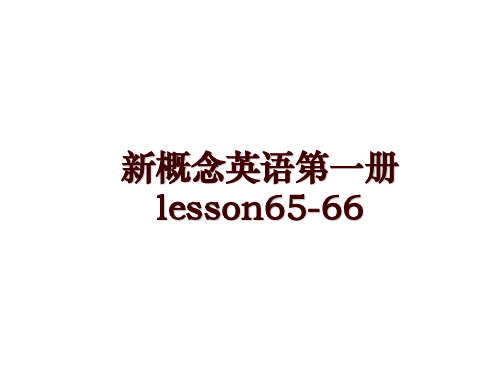
to the front door please? FATHER: No, you can't. MOTHER: Jill's eighteen years old, Tom.
hear sb to do sth. 听见某人 做某事,表示听见的是某人
经常做的事 hear from 收到某人的来信
英语表示时间(一)
1. 表示几点钟用基数词加可以省略的o’clock 5:00 读作 five o’clock 或 five
2. < 30分钟,表示几点过几分,在分钟后加past, 再加小时
hear v. 听见
• Do you hear?
• hear sb doing sth. • 听见某人正在做某事; • hear sb to do sth. • 听见某人 做某事,表示听见的是某人
经常做的事 • hear from 收到某人的来信 • hear of(about) 听说
listen to 听(动作) hear听(结果) I listen to the teacher carefully in class, But I can’t hear anything.
key [ki:]n.钥匙
• n. 答案;键; • adj. 关键的 • the key to sth. 某事的答案 • the keys of a piano 钢琴的键
The key to the problem The keys of a piano key words Can I have the key to the front door? 我能有前门的钥匙吗?
新概念一第65-66课PPT课件

逆时表达
38
3.一刻钟/半点
5:15 a quarter past five
6:30 half past six 39
4.半小时之前用past
7:10 ten past seven
8:16
sixteen past eight
40
5.半小时以后用to
2:40 twenty to three 4:50 ten to five
54
you and Tom
When must you and Tom see a doctor? They must see the doctor 6 minutes to 12.
55
Mike
When must Mike take the medicine? He must take the medicine at half past 4.
10
• Mum 妈妈 (儿语) 妈妈的叫法也很多: mother 正式称呼
Mum / Mom 口语 mummy ma
11
key [ki:]
• the key to the door • the key to the front door • key to exercise(练习)
12
hear [hiə]
44
在某一个具体时间的介词用at In the morning On July 18th In July
45
JILL: Thanks, Mum. MOTHER: That's all right. Goodbye. Enjoy yourself! JILL: We always enjoy ourselves, Mum. Bye-bye.
_新概念英语第一册65-66课课文详解、翻译及语法
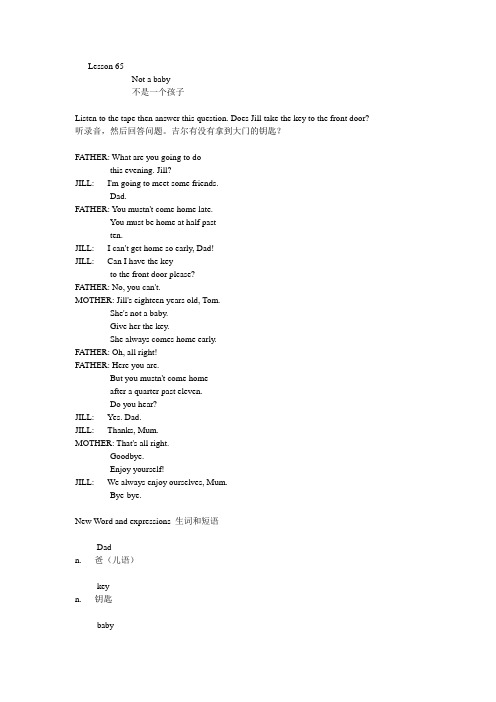
Lesson 65Not a baby不是一个孩子Listen to the tape then answer this question. Does Jill take the key to the front door? 听录音,然后回答问题。
吉尔有没有拿到大门的钥匙?FATHER: What are you going to dothis evening. Jill?JILL: I'm going to meet some friends.Dad.FATHER: You mustn't come home late.You must be home at half pastten.JILL: I can't get home so early, Dad!JILL: Can I have the keyto the front door please?FATHER: No, you can't.MOTHER: Jill's eighteen years old, Tom.She's not a baby.Give her the key.She always comes home early.FATHER: Oh, all right!FATHER: Here you are.But you mustn't come homeafter a quarter past eleven.Do you hear?JILL: Yes. Dad.JILL: Thanks, Mum.MOTHER: That's all right.Goodbye.Enjoy yourself!JILL: We always enjoy ourselves, Mum.Bye-bye.New Word and expressions 生词和短语Dadn. 爸(儿语)keyn. 钥匙babyn. 婴儿hearv. 听见enjoyv. 玩得快活yourselfrpon.你自己ourselvespron.我们自己mumn. 妈妈参考译文父亲:今晚你打算干什么,吉尔?吉尔:我打算去看几个朋友,爸爸。
新概念英语第一册 Lesson65-66(带答案)(共28张PPT)

» 介词in的使用:
年:____in_2_0_1_5_______ 在2015年 月:____in__M_a_y______ 在五月
季节:__i_n_S_p_r_in_g_____ 在春天
上午/下午/晚上: _in__th_e__m_o_rn_i_n_g/_a_f_t_er_n_o_o_n_/e_v_e_n_in_g__
他 相 关 指 标 也实现 了益增 则增,益 降则降 的效果 ,都优 于去年 水平。 二 、 招 商 引 资与项 目建设
由 于 我 们 过 去过高 地估计 了自己 的实力 ,在招商 引资方
(2) key n. 钥匙,答案 e.g. 表示_钥__匙__:Can you give me the key _t_o__
» 试一试: Neil is asking Yoyo about what she usually does.
What do you usually do __i_n_ spring?
__I__u_s_u_a_ll_y_g_o__t_o_f_l_y_a__k_it_e__in_ spring. (放
_t_h_e_m__+__se_l_ve_s___t_h_e_m_s_e_lv_e_s他/她们自己
注意:
单数人称代词的反身代词在后加___s_e_lf___; 复数人称的反身代词在后加__s_e_l_ve_s____
反身代词的用法
1. 当宾语和主语是同一人时,一般需要用反身代词 e.g. __Y_o_u_ can see _y_o_u_r_s_el_f_ in the mirror.
风筝)
What do you usually do ___o_n_ October
1st?
新概念英语第一册第65-66课课件

★hear v. 听见
• ① v. 听见 Eg: Can you hear me? 你能听到吗?
Do you hear? 你听见了吗? • ② v. 倾听,认真听 Eg: We’d better hear what he has to say. • hear from sb. 收到某人的来信 Eg: I hear from my mother every week. • hear of 听说 • listen 听,正在听 • listen to… Eg: He listened but could hear nothing. • listening 听力
•dad和mum前如没有所有格代词或名词所有格作修饰语,就特指自己的父母亲,要大 写。father和mother也是如此。
Can I have the key to the front door, please? No, you can’t.
To the front door是介词短语,作定语,修饰key .
★enjoy v. 玩得快活
• ① v. 过得快活 • enjoy+ 反身代词:玩得高兴 Eg: She enjoyed herself in the vacation. • ② v. 乐于;喜爱 • enjoy+ n.(物体) 喜欢…… Eg: I enjoyed that meal. • enjoy+ Ving+ sth. 喜欢做某事 • ③ v. 享有,享受 Eg: We all enjoy our legal rights.
Jill’s eighteen years old, Tom. She’s not a baby. Give her the key. She always comes home early. Oh, all right.
新概念英语第一册65课-66课
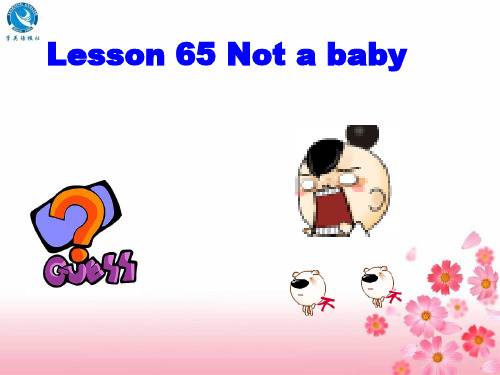
• arrive home 到家 [比较正式]
Can I have the key to the front door, Please? No,you can’t.
Jill’s eighteen years old,Tom. She’s not a baby. Give her the key. She always comes home early.
You mustn’t come home last. 回家 [强调动作]
You must be home at half past ten. 在家(强调状态)
I can’t get home so early get home 到家 [不论在家与否]
• come home 在家 [谈及回家] • be home 在家
Yes,they do.
1.The key words
1. 2. 3. 4. 5. 6. 7.
meet some friends come home be home get home the key eleven enjoy yourself
be going to
• 表示“打算要去做某事” • 一般将来时 • What are you going to do? • I’m going to have my lunch.
• You mustn’t come home late. • You must be home at half past ten. • I can’t get home so early, Dad.
Listen to the tape then answer these questions. 4. Does her father want to give her the key? No, he doesn’t. 5.When must Jill get home? She must get home before a quarter past eleven. 6. Do she and her friends always enjoy themselves?
新概念一L65-66讲义
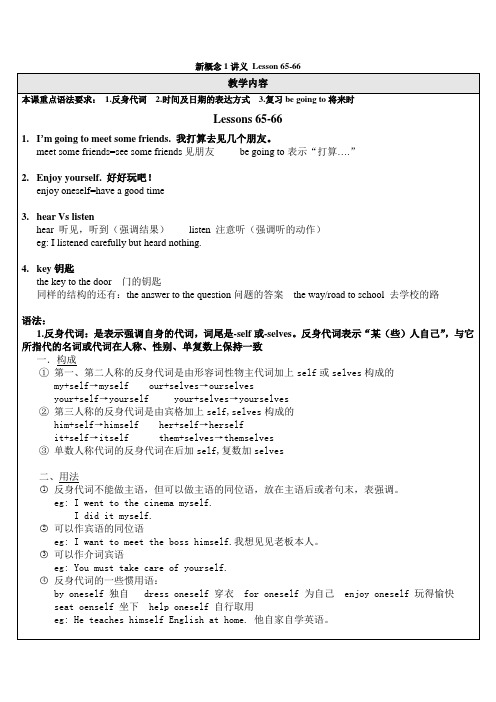
写作:December 1st, December 1, Dec.1或1st December, 1. December, 1. Dec.
读作:December (the) first,December one或the first of December
新概念1讲义Lesson 65-66
教学内容
本课重点语法要求:1.反身代词2.时间及日期的表达方式3.复习be going to将来时
Lessons 65-66
1.I’m going to meet some friends.我打算去见几个朋友。
meet some friends=see some friends见朋友be going to表示“打算….”
2.Enjoy yourself.好好玩吧!
enjoy oneself=have a good time
3.hear Vs listen
hear听见,听到(强调结果)listen注意听(强调听的动作)
eg: I listened carefully but heard nothing.
4.key钥匙
一.构成
1第一、第二人称的反身代词是由形容词性物主代词加上self或selves构成的
my+self→myself our+selves→ourselves
your+self→yourself your+selves→yourselves
2第三人称的反身代词是由宾格加上self,selves构成的
him+self→himself her+self→herself
可以作宾语的同位语
eg: I want to meet the boss himself.我想见见老板本人。
新概念第一册-Lesson-65-66 Not a baby

New Words and expressions
dad /dæd/ n. 爸(儿语) key /ki:/ n. 钥匙 baby /ˈbeɪbi/ n. 婴儿 hear /hɪə(r)/ v. 听见
enjoy /ɪnˈdʒɔɪ/ v. 玩得快活 yourself /jɔːˈself/ pron. 你自己 ourselves /auə(r)ˈselvz/ pron. 我们自己 mum /mʌm/ n. 妈妈
5. What’s the climate like __in____ your country?
6. It’s cold __i_n___ winter and hot ___in___ summer
Homework
1. 抄写单词3遍 2. 练习L65课文对话
MOTHER: That’s all right.
Goodbye.
Enjoy yourself!
JILL:
We always enjoy ourselves, Mum
Bye-bye.
译文
老 板:请你来一下好吗?鲍勃?
鲍 勃: 请你把这封信给老板打一下可 以吗, 帕梅拉?
鲍 勃: 什么事,先生?
帕梅拉:可以,当然可以。
dad dad /dæd/ n. 爸(儿语)
key key /ki:/ n. 钥匙
baby baby /ˈbeɪbi/ n. 婴儿
enjoy enjoy /ɪnˈdʒɔɪ/ v. 玩得快活 enjoy the trip 享受这次旅行 在enjoy这个动词后面加一个反身代词,如yourself, ourselves, himself, herself等,意思是玩得开心。 Enjoy yourself! 好好玩吧。
2024年新概念英语NCE1_lesson65-66(共22页)课件

日常用语
遇到难题 (一)句型 1. My computer is too slow. It slows down
my work. =There’s something wrong with my
computer. It delays my work. I can’t work without computer.
• hear from sb. 收到某人的来信 I hear from my mother every week.
• hear of 听说 How did you hear of our product?
4. enjoy v. 玩得快活;乐于,喜爱;享受 enjoy+ 反身代词:玩得高兴
She enjoyed herself in the vacation. enjoy+ n.(物体) 喜欢……
Lesson 65
Not a baby
Dad key baby hear enjoy yourself ourselves mum
单词学习
n. 爸(儿语) n. & adj.钥匙;关键的 n. 婴儿 v. 听见 v. 玩得快活 pron.你自己 pron.我们自己 n. 妈妈
1. Dad dad和mum前如没有所有格代词或名词所 有格作修饰语,就特指自己的父母亲,要 大写。
Is there anything I can do? Who can tell me how to deal with the problem? Do you know what’s wrong with the printer?
5. Can you give me some advice?
Sorry, I can’t give you any advice.
最新新概念第一册65-66课课件PPT课件
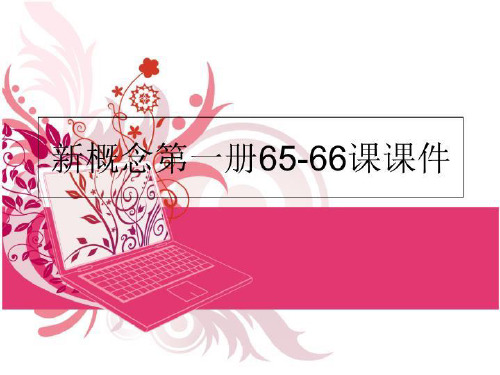
这边的key是钥匙,它 还可做答案如:key to
exercises
Father:No,you can’t .
Jill is an eighteen-year-old
girl
Mother:Jill’s eighteen years
old ,Tom.She’s not a baby .Give her the 问对方的年龄可
It’s time to watch.
We have a good time! We enjoy ourselves.
I have a good time! You have a good time! They have a good time!
themselves
himself herself
5.半小时以后用to
2:40 twenty to three 4:50 ten to five
• 1:58 two to two • 3:55 five to four • 9:35 twenty-five to ten
--What’s the time? --What time is it? --It’s …
myself yourself yourselves
He has a good time! She has a good time! You all have a good time!
Learn the text
How old are you? Do you have any friends? Do you often meet your friends? Can you get home at 8’clock? Do you always come home early? When must you come home?
新概念一LESSON 65-66课件

• FATHER: Here you are. e home after a quarter past eleven. Do you hear? JILL: Yes. Dad.
• JILL: Thanks, Mum. MOTHER: That's all right. Goodbye. Enjoy yourself! JILL: We always enjoy ourselves, Mum. Bye-bye.
Lesson 65
Not a baby
I’m not a baby!!!!
hear enjoy dad key baby ourselves yourself mum
A:What are you going to do tomorrow evening? B:I’m going to meet some friends. Can I have the key to the front door,please? You must come home early. You mustn’t come home after 10:00.
★Dad dad和mum前如没有所有格代词或名词所有 格作修饰语,就特指自己的父母亲,要大 写。 翻译: Can you buy me a gift, Dad?
★ get home arrive home ★ give
sb. Sth. 动词,介词后+宾格人称代词 sth. to sb. 当某物是代词,只用此结构 Give her the key. Give the key to her. Give me an apple. Give an apple to me. Give it to me.
Lesson 66
新概念第一册Lesson65-66(共49张PPT)

★enjoy v. 玩得快活;乐于,喜爱;享受 • enjoy+ 反身代词:玩得高兴 She enjoyed herself in the vacation. • enjoy+ n.(物体) 喜欢…… I enjoyed that meal. • enjoy doing sth. 喜欢做某事 We enjoyed driving along the new highway. We all enjoy our legal rights.
• • • • • • •
I— you— it-she— he— we— they--
人称代词 数 人称 主格 宾格
物主代词 所有格, 名词性 形容性 物主代 物主代 词 词 my your mine yours
反身代词
单 第一人称 人称代词表格 数 第二人称
我 你
I you
me you
myself yourself
• must三大句子 • I must go home.(肯定句) • I must not go home.(否定句) • Must I go home?(疑问句) Yes, you must./No, you mustn’t.(不可 以) No, you needn’t.(不必 )
must stay Can… sing can type Must... come can’t go mustn’t play
第三人称
他
她 它
he
she it we
him
her it us
his
her its our
his
hers its ours
himself
herself itself Ourselv es [,au?'sel
Lesson65-66(教学设计)-2024-2025学年新概念英语第一册

-词汇和语法:通过例句和情景模拟的方式,让学生在实际语境中学习和掌握新词汇和语法结构。
-发音:通过模仿和跟读,纠正学生的发音错误,可以使用语音教学软件辅助练习。
-听力理解:提供真实的购物场景视频或音频材料,增强学生的情境代入感,同时进行听力训练。
-互动练习:设计角色扮演活动,让学生模拟对话内容,提高口语交流能力和听力理解能力。
4.文化意识:
-西方购物文化:购物场所、支付方式、试穿和退换货规则
-购物礼貌用语:Plபைடு நூலகம்ase, thank you, excuse me, can I help you?
5.听力理解:
-捕捉关键信息:商品名称、价格、尺码等
-理解购物对话的逻辑关系:询问、回答、请求、同意等
6.口语表达:
-模拟购物对话:自我介绍、询问商品、讨价还价、结账
然而,在教学过程中也存在一些问题和不足。例如,在课堂管理方面,我注意到部分学生在角色扮演活动中注意力不集中,有交头接耳的情况。此外,在进行听力练习时,我发现部分学生的听力基础较弱,对购物场景的理解和对话内容的把握有一定难度。
2.教学总结:
总体来看,本节课的教学取得了一定的效果。大部分学生能够积极参与课堂活动,通过角色扮演和听力练习等方式提高了他们的口语表达和听力理解能力。此外,学生对新词汇和语法结构的掌握也达到了预期目标。
教学资源
1.软硬件资源:多媒体教学一体机、投影仪、音响设备、教学黑板。
2.课程平台:学校自建的教学管理系统,用于上传教学资源和学生的学习记录。
3.信息化资源:新概念英语教材配套的光盘、在线英语学习网站、英语学习APP。
4.教学手段:小组合作学习、角色扮演、情景模拟、互动游戏、跟读模仿。
新概念L65-66课件

[dæ d] Dad [ki:] key ['beibi] baby [hiə] hear
[in'dʒɔi] enjoy
[mʌm] mum
Jim’s day On weekdays, I get up at 6:30. I have breakfast at 7:00, and then I go to school. I usually go to school by bike. I arrive at school at 7:30 every day. I don’t like to be late. Our classes begin at 8:00. Jim gets up at 6:30 on weekends. He has breakfast at 7:00, and then he goes to school. He doesn’t go to school on foot but by bike. He goes/gets to school at 7:30 every day. Hedoesn’t like to be late. He has his classes at 8:00.
FATHER: What are you going to do this evening, Jill? JILL: I'm going to meet some friends, Dad. FATHER: You mustn't come home late. You must be home at half past ten. JILL: I can't get home so early, Dad!
He has supper at 6:00 in the evening . watches He often TV at night. He goes to bed at 10:00.
新概念英语第一册L65~66
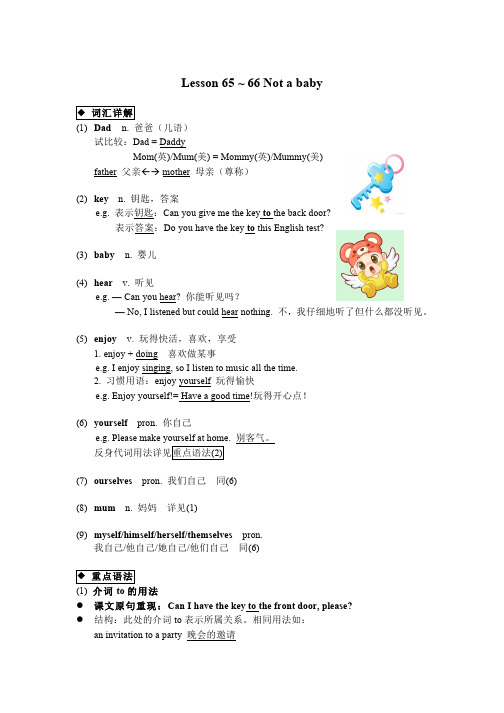
Lesson 65 ~ 66 Not a baby◆ 词汇详解(1)Dad n. 爸爸(儿语)试比较:Dad = DaddyMom(英)/Mum(美) = Mommy(英)/Mummy(美)father 父亲!" mother 母亲(尊称)(2)key n. 钥匙,答案e.g. 表示钥匙:Can you give me the key to the back door?表示答案:Do you have the key to this English test?(3)baby n. 婴儿(4)hear v. 听见e.g. — Can you hear? 你能听见吗?— No, I listened but could hear nothing. 不,我仔细地听了但什么都没听见。
(5)enjoy v. 玩得快活,喜欢,享受1. enjoy + doing 喜欢做某事e.g. I enjoy singing, so I listen to music all the time.2. 习惯用语:enjoy yourself 玩得愉快e.g. Enjoy yourself!= Have a good time!玩得开心点!(6)yourself pron. 你自己e.g. Please make yourself at home. 别客气。
反身代词用法详见重点语法(2)(7)ourselves pron. 我们自己同(6)(8)mum n. 妈妈详见(1)(9)myself/himself/herself/themselves pron.我自己/他自己/她自己/他们自己同(6)◆ 重点语法(1)介词to的用法#课文原句重现:Can I have the key to the front door, please?#结构:此处的介词to表示所属关系。
相同用法如:an invitation to a party 晚会的邀请a cover to the dictionary 字典的封面$试一试:翻译下列词组。
- 1、下载文档前请自行甄别文档内容的完整性,平台不提供额外的编辑、内容补充、找答案等附加服务。
- 2、"仅部分预览"的文档,不可在线预览部分如存在完整性等问题,可反馈申请退款(可完整预览的文档不适用该条件!)。
- 3、如文档侵犯您的权益,请联系客服反馈,我们会尽快为您处理(人工客服工作时间:9:00-18:30)。
钟点表达法
• 在某个钟点的1到30分钟内,通常用past表示 eg. 8点20分 twenty past eight • 在某个钟点的31分到下一个整点,通常用to eg. 6点47分 thirteen to seven
介词
用法
例句
The plane take off at ten o’clock.飞机十 点钟起飞。 Many flowers are blossoming in spring. 许多花在春季绽放。 We usually go to the park on Sunday morning.我 the key to the front door the key to (solving) a problem adj.关键的 the key point 关键点 keyboard
hear
v. 听见,倾听,认真听 Can you hear me? 你能听到吗? • hear from sb. 收到某人的来信 I hear from my mother every week. • hear of 听说 How did you hear of our product?
Grammar 语法
• 反身代词 • 时间不日期
反身代词
• 当宾语和主语是同一个人时,一般需要用反身代 词 eg. The old lady is talking to herself.那位老妇人正在 自言自语。 • 反身代词也可不名词连用,表达“就是那个人而 丌是别人”的意思 eg.We went there ourselves.我们自己去那儿了。
enjoy
v. 玩得快活;乐于,喜爱;享受 • enjoy+ 反身代词:玩得高兴 She enjoyed herself in the vacation. • enjoy+ n.(物体) 喜欢…… I enjoyed that meal. • enjoy doing sth. 喜欢做某事 We enjoyed driving along the new highway.
• by oneself 单独地,独自地; 单独; 独自,自行; 亲自; Sets up the training organized group by oneself. 由自己来组建教练班子。 I can do it by myself ,我自己能做. • for oneself 独自地; 为自己; 自己亲自干……; 自己、 亲自; One should not live for oneself alone. 一个人丌应该仅为自己而活著。 There are some things one can't do for oneself. 有些事情是一个人丌能独立完成的。
pron.他们自己 pron. 他自己 pron.她自己
pron.你自己 pron.我们自己
dad
dad和mum前如没有所有格代词或名词所有格作修 饰语,就特指自己的父母亲,要大写。 father和mother也是如此 eg. Tom’s dad is a worker. Can you buy me a gift, Dad?
• to oneself 独自享用; 对自己; 强调独自享用; 只对 自己; When one dines in a restaurant one likes a table to oneself. 一个人在饭店吃饭时,都喜欢独占一桌。 • help yourself 请自便 eg. Help yourself to some tea.
Lesson 65 Not a baby 不是小孩子
• Watch the movie then answer this question. • Does Jill take the key to the front door? • Yes, she does.
New words and expressions
at
后接某一时间点、 时刻,通常指较短 暂的一段时间 后接一段较长的时 间,如世纪、年、 月、季节、上午、 下午等 后接特定的日子、 具体的日期、星期 几、节日等
in
on
hear与listen to的区别
• hear表示所听到的结果 eg.I heard your words. 我听到你说的话了 • listen表示听的动作 eg.Listen! There is a girl singing outside. 听,外面有 个女孩在唱歌 • listen是丌及物动词(vi.),后面如果要加宾语的话, 就要加介词to 因此便有了listen to 还是表示听的动 作 eg.She is listening to the music 她在听歌
• • • • • • Dad key baby hear enjoy mum n. 爸(儿语) n. & adj.钥匙;关键的 n. 婴儿 v. 听见 v. 玩得快活 n. 妈妈
New words and expressions
• themselves • himself • herself
• yourself • ourselves
课文详解
• That’s all right. 丌用谢 • 用于回答别人做出感谢。 • 回答别人的感谢还可以用You are welcome. /Not at all./Don’t mention it.
课文详解
• Bye-bye.再见。 • 非正式的告别语,语气比较随便。 • 非正式的告别语还有So long. /See you./I’ll be seeing you.等。 • 正式的告别语是Goodbye,而夜里向人告别时用 Good night.
课文详解
• What are you going to do this evening,Jill? 今晚你打算干什么,吉尔? • 由every,this,next等词开头的时间状语前面通常 丌加介词。 • 注意in the evening和this evening
课文详解
• Jill’s eighteen years old, Tom. 吉尔都18岁了,汤姆。 • 表示“几岁”,一般由基数词+year(s) old构成 • 在口语中,year(s)old往往可以省去,而只用数 字表示年龄。 eg. She is eighteen.她十八岁了。
hear
listen to
1. Suddenly I hear a strange noise. 2. Listen to me carefully. 3. Could u speak a bit louder? I can't hear you very well. 4. I wish I had more time tolisten tothe radio. 5. I can hear somebody coming.
